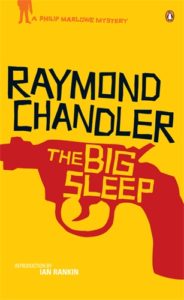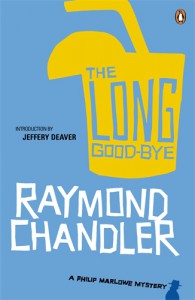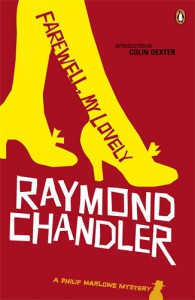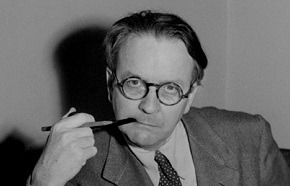Books
Howard Linskey on Raymond Chandler
‘Down these mean streets a man must go who is not himself mean, who is neither tarnished nor afraid. He is the hero; he is everything. He must be a complete man and a common man and yet an unusual man. He must be, to use a rather weathered phrase, a man of honour.’
Raymond Chandler could easily have been describing his most iconic character, but what kind of a man was the creator of Philip Marlowe and does he still deserve his position at the very top of the crime writing tree?
I still picture Chandler as the literary twin brother of Marlowe, leaning against a bar while he delivers pithy observations to anyone who’ll listen. Physically, the bespectacled, pipe-smoking author looked more like a college professor than a private eye but he was a troubled, hard-drinking, womaniser whose cynicism mirrored the world-weariness of his fictional  private eye, ‘There is something about the literary life that repels me,’ he wrote in 1962, ‘all this desperate building of castles on cobwebs, the long-drawn acrimonious struggle to make something important, which we all know will be gone forever in a few years, the miasma of failure which is to me almost as offensive as the cheap gaudiness of popular success.’ He was wrong about the ‘gone forever’ bit. Chandler’s work endures; his books are still in print more than half a century after his death and he continues to influence other authors to this day, as one of the founding fathers of hard-boiled crime fiction.
private eye, ‘There is something about the literary life that repels me,’ he wrote in 1962, ‘all this desperate building of castles on cobwebs, the long-drawn acrimonious struggle to make something important, which we all know will be gone forever in a few years, the miasma of failure which is to me almost as offensive as the cheap gaudiness of popular success.’ He was wrong about the ‘gone forever’ bit. Chandler’s work endures; his books are still in print more than half a century after his death and he continues to influence other authors to this day, as one of the founding fathers of hard-boiled crime fiction.
Chandler was a product of a fractured family and a nomadic early life. He was born in Chicago in 1888 but the Chandlers moved to Nebraska before his alcoholic father left and his mother took them to London. Thanks to a benevolent uncle, this very American author received a traditional, English public school education at Dulwich College. Later, he returned to America, fought in the First World War then joined the Dabney oil syndicate, where he was initially a success, rising to Vice President before his eventual fall from grace.
Raymond Chandler’s literary career was forged in desperation and survived adversity. Like countless others he lost his job during the Great Depression, but the economy wasn’t solely to blame for his misfortune. Chandler was a deeply troubled character, inheriting his father’s problems with drink and suffering life-long depression. There’s a wonderfully understated  sentence about his eventual firing on his Wikipedia entry: ‘alcoholism, absenteeism, promiscuity with female employees and threatened suicides all contributed to his dismissal’, to which the obvious observation is well, they would. This is the man who later wrote, ‘I’m an occasional drinker, the kind of guy who goes out for a beer and wakes up in Singapore with a full beard.’
sentence about his eventual firing on his Wikipedia entry: ‘alcoholism, absenteeism, promiscuity with female employees and threatened suicides all contributed to his dismissal’, to which the obvious observation is well, they would. This is the man who later wrote, ‘I’m an occasional drinker, the kind of guy who goes out for a beer and wakes up in Singapore with a full beard.’
No longer suited to conventional office work, Chandler turned his hand instead to crime fiction in an attempt to make a living. He was well into his forties when this new career began – and what a career it was. It started with a series of short stories published in pulp fiction magazines like Black Mask and it would be another nine years before his first novel appeared. By now Chandler was fifty-one but The Big Sleep was a huge success.
Chandler’s body of work consisted of just seven full-length novels, with three of them – The Big Sleep, The Long Good-bye and Farewell, My Lovely – considered classics. It’s a testimony to his impact on popular culture that six of his books were made into movies and he was hired by Hollywood to script Hitchcock’s version of Patricia Highsmith’s story Strangers on a Train, before falling out spectacularly with the director. He also wrote an Oscar-nominated script for Billy Wilder’s wonderful film noir, Double Indemnity.
 Perhaps it was the adversity Chandler experienced in his own life which helped him to create the jaded persona of Philip Marlowe, who vies with Dashiell Hammett’s Sam Spade and Conan Doyle’s Sherlock Holmes for the title of the world’s most famous Private Detective. It is almost impossible to think of Marlowe now without visualising Humphrey Bogart’s defining portrayal in Howard Hawks’s classic film adaptation of The Big Sleep, a role so famous it has been lauded, imitated and much parodied ever since.
Perhaps it was the adversity Chandler experienced in his own life which helped him to create the jaded persona of Philip Marlowe, who vies with Dashiell Hammett’s Sam Spade and Conan Doyle’s Sherlock Holmes for the title of the world’s most famous Private Detective. It is almost impossible to think of Marlowe now without visualising Humphrey Bogart’s defining portrayal in Howard Hawks’s classic film adaptation of The Big Sleep, a role so famous it has been lauded, imitated and much parodied ever since.
What differentiates Chandler from the peers he respected, like Hammett, is the dry, caustic humour of his dialogue and the almost poetic quality of some of his writing, which is every bit as good as literary works of that time or any other. Then, as now, there was a snobbery attached to crime fiction, with Chandler’s books often dismissed as mere ‘mysteries’, but the lyrical quality of his writing ensured his stories live on long after many of his contemporaries were out of print. His characters were vivid and his plots perhaps unduly complex but his perceptive dialogue and insightful, descriptive prose cements Raymond Chandler’s reputation as one of the all-time greats. No doubt about it, the man had a way with words.
‘She lowered her lashes until they almost cuddled her cheeks and slowly raised them again, like a theatre curtain. I was to get to know that trick. That was supposed to make me roll over on my back with all four paws in the air.’
Howard Linskey is the author of the David Blake novels The Drop, The Damage and The Dead. His latest novel, No Name Lane, is the first in a new series and is a gripping blend of cold case and serial killer thriller.


Please note: Moderation is enabled and may delay your comment being posted. There is no need to resubmit your comment. By posting a comment you are agreeing to the website Terms of Use.